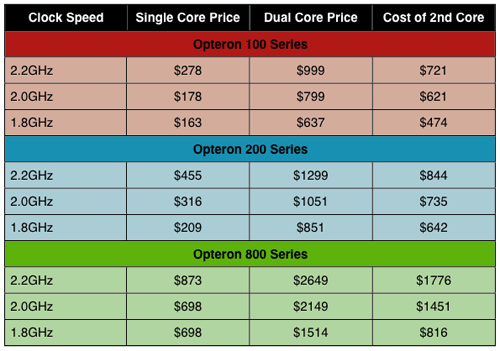AMD's dual core Opteron & Athlon 64 X2 - Server/Desktop Performance Preview
by Anand Lal Shimpi, Jason Clark & Ross Whitehead on April 21, 2005 9:25 AM EST- Posted in
- CPUs
The Lineup - Opteron x75
Prior to the dual core frenzy, multiprocessor servers and workstations were referred to by the number of processors that they had. A two-processor workstation would be called a 2-way workstation, and a four-processor server would be called a 4-way server.Both AMD and Intel sell their server/workstation CPUs not only according to performance characteristics (clock speed, cache size, FSB frequency), but also according to the types of systems for which they were designed. For example, the Opteron 252 and Opteron 852 both run at 2.6GHz, but the 252 is for use in up to 2-way configurations, while the 852 is certified for use in 4- and 8-way configurations. The two chips are identical; it's just that one has been run through additional validation and costs a lot more. As you may remember, the first digit in the Opteron's model number denotes the sorts of configurations for which the CPU is validated. So, the 100 series is uniprocessor only, the 200 series works in up to 2-way configurations and the 800 series is certified for 4+ way configurations.
AMD's dual core server/workstation CPUs will still carry the Opteron brand, but they will feature higher model numbers; and while single core Opterons increased in model numbers by 2 points for each increase in clock speed, dual core Opterons will increase by 5s. With each "processor" being dual core, AMD will start referring to their Opterons by the number of sockets for which they are designed. For example, the Opteron 100 series will be designed for use in 1-socket systems, the Opteron 200 series will be designed for use in up to 2-socket systems and the Opteron 800 series will be designed for use in 4 or more socket systems.
There are three new members of the Opteron family - all dual core CPUs: the Opteron x65, Opteron x70 and Opteron x75.

- The fastest dual core runs at 2.2GHz, two speed grades lower than the fastest single core CPU - not too shabby at all.
- The slowest dual core CPU is priced at the same level as the fastest single core CPU; in this case, $637.
- Unlike Intel, AMD's second core comes at a much higher price. Take a look at the 148 vs. 175. Both run at 2.2GHz, but the dual core chip is over 3.5x the price of the single core CPU.


While AMD will undoubtedly hate the comparison below, it's an interesting one nonetheless. How much are you paying for that second core on these new dual core Opterons? To find out, let's compare prices on a clock for clock basis:











144 Comments
View All Comments
ceefka - Thursday, April 21, 2005 - link
So, would an nForce 3 250 board work with an A64 X2?smn198 - Thursday, April 21, 2005 - link
#4 "I find it strange why AMD did not release <2.2GHz A64 X2s? Maybe due to manufacturing issues?"When you make a dual core CPU, a defect on one of them makes the whole lot worthless. I believe that to try and reduce this, they can increase yield by producing lower clocked parts
L3p3rM355i4h - Thursday, April 21, 2005 - link
#9 you're dreamin' Theres no way that AMD can sell a 1.8ghz chip for sub-$200 when a frickin' venice is retailing for $179. A 1.8ghz chip would be upper $300 to lower $400s.But, damn the "X2" performs nicely. Just think, with a stable, higher performing motherboard with decent timings how much better it would get.
Shinei - Thursday, April 21, 2005 - link
Nice, dual-core. AMD's going to be hurt badly by the lack of volume on their X2 units, though, considering that Intel's got the money to post minor losses on each chip sold just to regain their marketshare. I'm surprised AMD hasn't tapped IBM to give them one or two 65nm fabs to prepare for the A64X2 launch later this year...AnnihilatorX - Thursday, April 21, 2005 - link
hm hope fab36 would increaswe production capacity of AMD and lower the cost down a bitblckgrffn - Thursday, April 21, 2005 - link
Awesome...I wish we could have seen a 4 socket 8 processor system rocking out with those four way xeons though, that would really illustrates some differences ;)I agree with the previous sentiment on the x2's, I hope they bring out a sub $200 1.8 ghz or so model. I will be sticking this in my desktop box, not my gaming box, so if they can't bring anything out under $200 I will probably have to go with Intel. Boo for that ;)
Nat
Zebo - Thursday, April 21, 2005 - link
It's a wonderful article Anand, always love yours.. very in-depth But you're forgetting mem timings??? Arr.:)Zebo - Thursday, April 21, 2005 - link
Slobber:Pblackbrrd - Thursday, April 21, 2005 - link
#4 AMD probably wants you to buy their single core cpus instead, as they are much cheaper to produce and easier to produce in quantities. AMD would probably have problems delievering a lower cost dual core in quantities .Who doesn't drewl for a A64 X2 after seeing this review??? I certainly do.
The dual core intel wouldn't be so bad either, except for the amount of heat it produces off.
filterxg - Thursday, April 21, 2005 - link
Nice article. AMD has obviously awoken a sleeping giant, and Intel is fighting back on the pricing front. Hopefully the gamble that AMD single cores can hold their own versus Intel Duallies is true on the mid-low end (at least for the near future). I won't be buying an Intel chip anytime soon (unless I need a laptop).Either way I figure I got 2.5 years before I need a dualcore, and by then who knows. So bravo to both companies for this innovation.